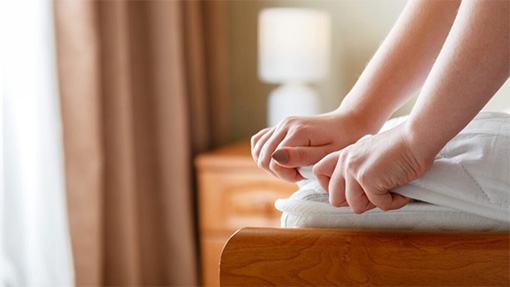24-hour Tips to Improve Sleep
by Colin Butler
Vertex Education Ambassador, Fitness
Morning Routines
1. Pick a wake-up time and stick to it.
Setting the same wake-up time every morning is essential and it’s best to maintain that every day, even on the weekends. According to the American Academy of Sleep Medicine, the minimum recommended sleep for healthy adults is seven hours a night, but you may need more than the recommended hours of sleep to feel fully rested.
2. Tidy your bedroom in the morning.
Need a great place to start? Make your bed every morning, keep your room neat, keep laundry and any unsorted mail or paperwork out of sight. It’s calming to tidy up at the start of the day, so you enter a fresh, neat bedroom at night. There is research suggesting that a neat environment helps facilitate the onset of sleep and better sleep quality.

3. Exercise outside or somewhere bright.
Regular exercise can be beneficial for healthy sleep, and morning sunlight is a strong stimulus to lock in your body clock and keep you on a regular schedule.
Exercising somewhere bright, whether it’s outdoors or in a well-lit indoor space, helps wake up your brain for a more productive start.

Evening Routines
1. Don’t eat too late.
Eat dinner on the early side. If you drink alcohol, it’s best to have it as soon as you get home from work in the evening — and in moderation. Alcohol suppresses deep sleep, delays REM sleep, is dehydrating, and is a muscle relaxer, so it often worsens breathing and can even cause sleep apnea.
2. Establish a wind-down routine.
To prepare your body to sleep, prioritize a wind-down routine before your target bedtime which can include reading, breathing exercises, yoga, stretching, or meditation. Start with five minutes, then building up to a 20-minute routine and use this as a dedicated time to process your thoughts from the day and anticipate what needs to get done the following day.

3. Stay away from screens.
Avoid using technology an hour before bedtime because bright screens can delay melatonin release, which is important for sleep, and prevent you from sleeping when you intend to. Creatively rearrange how you spend your time. Reading a book in bed can be a great way to prep your body for sleep because you’re not going to get the blue light exposure from screens, triggering your brain to stay awake. Blue light can prevent sleep and melatonin release, and that’s important for falling asleep. Use the phone and watch TV earlier in the evening, not right before sleeping.
4. Go to bed around the same time.
It’s important to have a regular bedtime because that helps our body anticipate regular sleep. That time doesn’t have to be set in stone, but you should aim to make your bedtime early enough to allow for seven to eight hours of sleep a night. And if you do stay up a little later occasionally, don’t stress about it.
5. Make bedtime joyful and relaxing.
Work on cultivating a feeling of joy when you climb into bed. Find the enjoyment of simply relaxing in your bed. It beats a lot of other places and situations you could find yourself in.

6. What you do all day matters, too.
Small changes like not drinking coffee after noon, setting regular mealtimes, making sure you find some time to move and get some light throughout the day, all contribute to a good night’s sleep. Healthy sleep starts with the way you navigate your day as well as making choices to optimize quality sleep at night.

